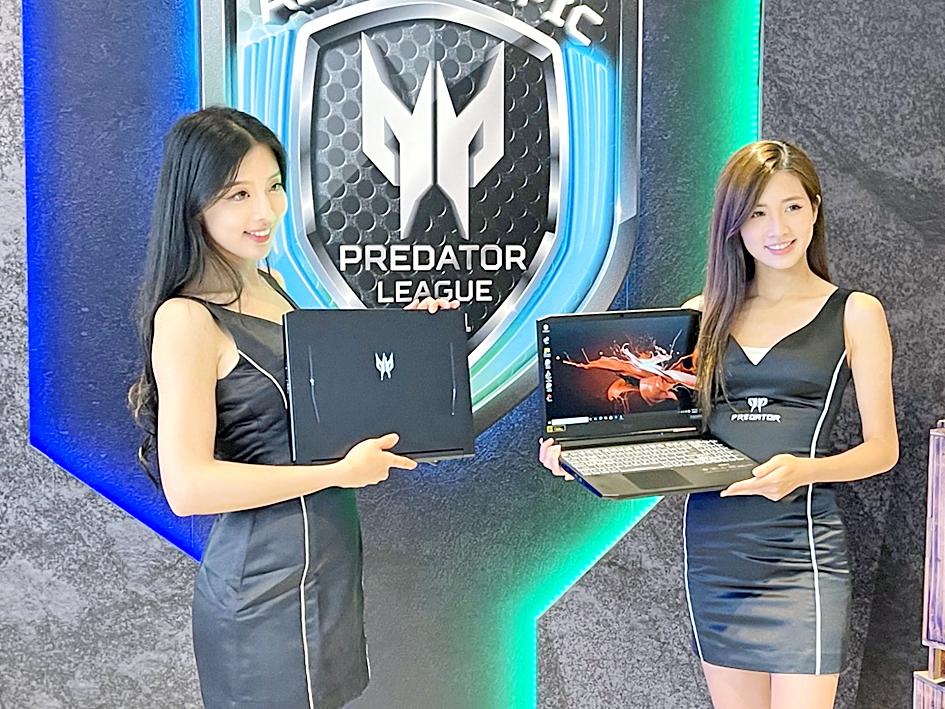Acer Inc (宏碁) yesterday reported a net profit of NT$2.74 billion (US$98 million) for last quarter, marking the PC brand’s highest quarterly earnings in a decade.
That represented growth of 391 percent from NT$558 million a year earlier.
On a quarterly basis, net profit jumped about 37 percent from NT$1.99 billion in the fourth quarter of last year.

Photo: CNA
Earnings per share surged to NT$0.91 last quarter from NT$0.18 a year earlier and NT$0.67 the previous quarter.
Consolidated revenue reached NT$71.56 billion in the first quarter, up 46.5 percent year-on-year.
Gross profit was NT$8.31 billion, up 67.9 percent year-on-year.
Operating income was NT$2.81 billion, “with a historically high first-quarter margin of 3.9 percent,” a news release by Acer said.
Continued strong demand for notebook PCs contributed to Acer’s robust first-quarter figures.
The distance-learning market in the US, Europe, Japan and Southeast Asia is going strong, while the company’s first-quarter Chromebook sales grew 141 percent year-on-year, a report by the Chinese language Commercial Times said.
Acer’s investment in e-sports has also paid off, with its e-sports laptops, desktops and monitors growing 87 percent year-on-year, the report said.
Acer also announced yesterday on the Taiwan Stock Exchange that it would be selling 4.6 million shares of its subsidiary Highpoint Service Network Corp (海柏特).
According to the Chinese-
language Web site cnyes.com, Highpoint is planning an initial public offering (IPO) in the fourth quarter of this year.
It aims to list on the emerging market index in the second quarter of next year and move to the Taiwan Stock Exchange in the second quarter of 2023, if everything goes well, cnyes.com said.

COMPETITION: AMD, Intel and Qualcomm are unveiling new laptop and desktop parts in Las Vegas, arguing their technologies provide the best performance for AI workloads Advanced Micro Devices Inc (AMD), the second-biggest maker of computer processors, said its chips are to be used by Dell Technologies Inc for the first time in PCs sold to businesses. The chipmaker unveiled new processors it says would make AMD-based PCs the best at running artificial intelligence (AI) software. Dell has decided to use the chips in some of its computers aimed at business customers, AMD executives said at CES in Las Vegas on Monday. Dell’s embrace of AMD for corporate PCs — it already uses the chipmaker for consumer devices — is another blow for Intel Corp as the company

MediaTek Inc (聯發科) yesterday said it is teaming up with Nvidia Corp to develop a new chip for artificial intelligence (AI) supercomputers that uses architecture licensed from Arm Holdings PLC. The new product is targeting AI researchers, data scientists and students rather than the mass PC market, the company said. The announcement comes as MediaTek makes efforts to add AI capabilities to its Dimensity chips for smartphones and tablets, Genio family for the Internet of Things devices, Pentonic series of smart TVs, Kompanio line of Arm-based Chromebooks, along with the Dimensity auto platform for vehicles. MeidaTek, the world’s largest chip designer for smartphones

TECH PULL: Electronics heavyweights also attracted strong buying ahead of the CES, analysts said. Meanwhile, Asian markets were mixed amid Trump’s incoming presidency Taiwan Semiconductor Manufacturing Co (TSMC, 台積電) shares yesterday closed at a new high in the wake of a rally among tech stocks on Wall Street on Friday, moving the TAIEX sharply higher by more than 600 points. TSMC, the most heavily weighted stock in the TAIEX, rose 4.65 percent to close at a new high of NT$1,125, boosting its market value to NT$29.17 trillion (US$888 billion) and contributing about 400 points to the TAIEX’s rise. The TAIEX ended up 639.41 points, or 2.79 percent, at 23,547.71. Turnover totaled NT$406.478 billion, Taiwan Stock Exchange data showed. The surge in TSMC follows a positive performance

FUTURE TECH: Nvidia CEO Jensen Huang would give the keynote speech at this year’s Consumer Electronics Show, which is also expected to highlight autonomous vehicles Gadgets, robots and vehicles imbued with artificial intelligence (AI) would once again vie for attention at the Consumer Electronics Show (CES) this week, as vendors behind the scenes would seek ways to deal with tariffs threatened by US president-elect Donald Trump. The annual Consumer Electronics Show opens formally in Las Vegas tomorrow, but preceding days are packed with product announcements. AI would be a major theme of the show, along with autonomous vehicles ranging from tractors and boats to lawn mowers and golf club trollies. “Everybody is going to be talking about AI,” Creative Strategies Inc analyst Carolina Milanesi said. “From fridges to ovens